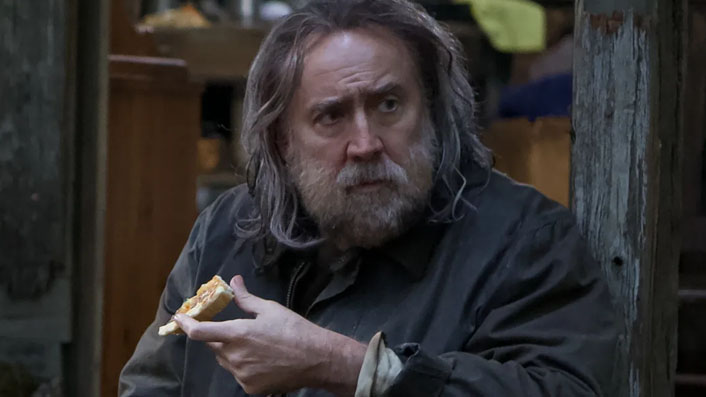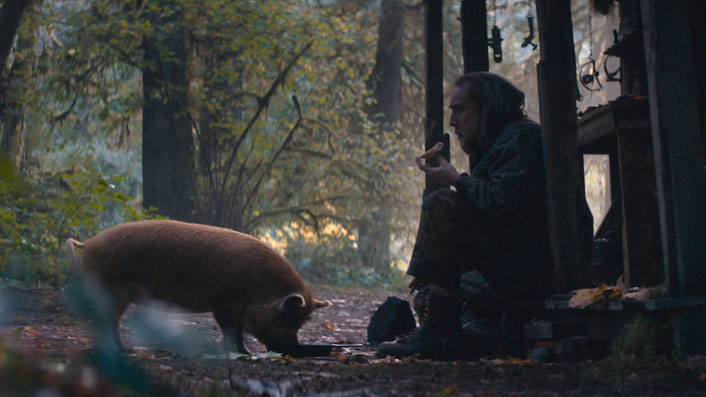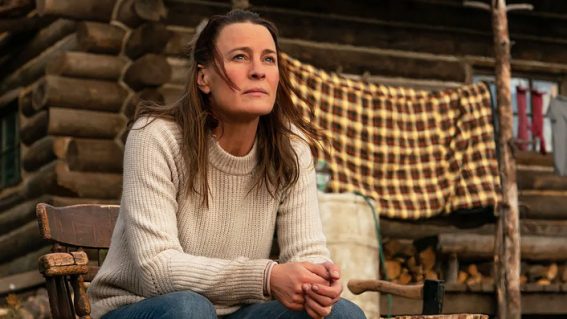Nicolas Cage delivers one of his most acclaimed performances for years in Pig

Nicolas Cage delivers one of his most acclaimed performances in years in Pig, in cinemas here this week (except Auckland, sorry). Here’s Luke Buckmaster’s review.
The opening moments of Pig coyly approach the matter of when and how to reveal Nicolas Cage, with writer/director Michael Sarnoski initially treating the star as if he were the shark from Jaws: something to keep up his sleeve, deployed for maximum impact. There’s a close-up of Cage’s hands in a creek (but they could be anyone’s) chased by a long shot of him standing next to the water (ditto). Then another long shot looking at the actor out of a cabin doorway—one of countless ‘frame within a frame’ compositions inspired by John Ford’s highly influential western The Searchers.
See also:
* Movies now playing in cinemas
* All new streaming movies & series
But soon Sarnoski can’t get enough of Cage, and we wouldn’t want it any other way. The prolific actor delivers an intensely morose yet understated performance as the truffle farmer and recluse Rob Feld, looking unkempt in nondescript old clothes and fingerless gloves, with a banged-up and bloodied face that makes you want to reach for the saline. At one point a supporting character articulates what everyone is thinking, asking Rob “I’m sorry, do you need medical attention?”
The answer is almost certainly yes—but he isn’t the kind of bloke who applies bandaids or ‘does’ selfcare. Plus Rob has something else on his mind, something he considers extremely important: finding his beloved pig.

The chubby swine is stolen early on in a well-staged sequence with the camera hovering around Cage, recording the scene from roughly his perspective, presenting no clear view of the bastards breaking in. This loathsome act is a MacGuffin to push the protagonist back into the land of the living. It disrupts the creekside peace of those early moments and brings on a heavy-heartedness that swells until the end, made explicit at all times through Cage’s beyond ravaged and beyond weary countenance: the scummy look of a man who accepted personal oblivion a long time ago.
This richly textured, skillfully shot (by Patrick Scola) and eventually moving film aches and groans under the weight of its impression of the world. Much of its impact comes down to Cage’s presence as an almost mythical man who seems to be able to see right through people, with no compulsion to cater for the whims of polite society.
The film’s thematic centrepiece is played in the key of a prickly dialogue exchange between Rob and the head chef of an ultra fancy restaurant (where the scene takes place).
To say the protagonist is unimpressed with this upscale eatery is obvious; we would assume that even if he never stepped foot in the door. What we don’t expect is a Baudrilliarian rant about how the food isn’t real, the restaurant isn’t real, how “you’re not real; none of this is real.” Without directly stating it, Sarnoski makes it clear why Rob left the civilised world: too many simulations; too many constructs; too much of what Baudrillard called simulacra—copies of things that never or no longer have an original. Too much fakeness.
A more obvious interpretation of that rant would view it as anti-consumerist—but a subsequent comment from the protagonist in an important later scene ties it together in the context of subjective and objective reality. I can’t elaborate on what he says, because it rests in the domain of spoilers, but it involves Rob entertaining the idea of telling himself a lie in order to change his broader attitudes: doublethink as a kind of self-help strategy.
You’ve probably guessed by now that this is not a film designed to appeal to the Farmer Hoggett in us, which is to say: it’s not about the pig. Cage is the man of the hour, the main feature, the special effect. Contrary to what you may read in other reviews, it is still an eccentric performance (you can be both eccentric yet understated) albeit not the kind most common in the actor’s oeuvre. Its closest equivalent is probably his soulful performance as a Texas ex-con in David Gordon Green’s touching 2013 drama Joe.
Cage has pulled the eccentricities inwards and swallowed them up: a vacuum to his usual volcano. It’s tempting to say he alone makes Pig worthwhile, but that sells short the holisticness of the vision around him. Everything is tuned to his presence—from the film’s earthy hues, which emulate the tone of Rob’s bush home even when he is in the city, to its uncluttered character-driven plot. It opens with not enough Cage, and we leave wanting more. Viva la Cage!

















